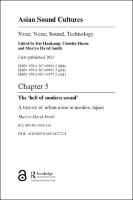Chapter 5 The ‘hell of modern sound’
Proposal review
A history of urban noise in modern Japan
Abstract
Contemporary Japan is loud. Many scholars have argued that the Japanese have a cultural propensity to embrace urban noise. Yet little research has been done on the history of urban noise in Japan. Far from passively accepting or culturally embracing noisy cities, the Japanese have long struggled with the definition, measurement, and control of unwanted sound. Urban noise and the idea of the ‘modern’ soundscape has often worked within a feedback loop that amplifies politically driven debates about the nature of ‘modernity’, the meaning of ‘civilisation’ and the nature of the Japanese people. Since the late nineteenth century, authorities' concern for urban noise stemmed from a fear of embarrassment because of the low-level of ‘civilisation’ amongst the people. Yet rapid industrial development and urban population growth soon posed the problem of urban noise as one of technological expertise-the people were too backward to understand and the issue was best solved by the experts. As groups of scientists, engineers and acousticians began to come together to debate solutions, they foregrounded urban noise as a problem of traffic, transport, and civic construction, not individual everyday life. Noisy neighbours, street noise, or people going about their daily business came to be heard as ‘urban music’ in contrast to ‘urban noise’. After 1945, better technological possibilities for sound proofing and an increasing focus on individual responsibility refocused urban noise as a problem of everyday life. With the end of the period of rapid economic growth in the 1970s, and the growing awareness of wider environmental problems, the noise of everyday life in the cities was gradually recast as one element of ‘urban noise’.
Book
Asian Sound CulturesKeywords
Asian; Christin; Cultures; Haukamp; Hoene; Iris; Matyn; Noise; Smith; Sound; Technology; Voice; Ethnomusicology; PerformanceDOI
10.4324/9781003143772-8ISBN
9780367698911, 9780367698973, 9781003143772Publisher
Taylor & FrancisPublisher website
https://taylorandfrancis.com/Publication date and place
2023Imprint
RoutledgeClassification
Music
Theory of music and musicology
Regional / International studies


 Download
Download